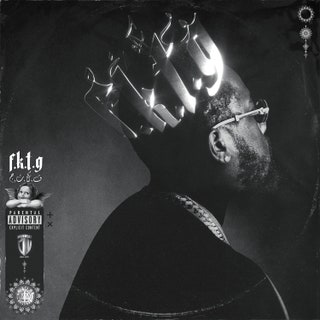By: Tommy “T-Rod” Rodriguez
“How does a king become a god?”
The answer to this question is something that Demond Price seeks to find on From King to A GOD. Price, better known as Conway the Machine, is a Buffalo rapper that seems to embody a kingpin archetype much more than a divine one. His raps are vicious, painting a portrait of a drug-laden empire at which he sits at the top, dealing with some of the most dangerous circumstances in America while becoming a symbol of wealth and extravagance. He sees himself as a ruler of the streets, wielding influence and power like such a figure as himself should…but at what point does material power stop, and real power begin?
On From King to A God, Conway begins his transition into the omnipotent rap figurehead he was born to be. He simultaneously embraces his dark past and need to heal, calls on his followers to enact change in a broken system, and challenges himself with some new sounds. This album is Conway’s metamorphosis from simply being a good rapper to something much more powerful.
At the outset, From King to A GOD sounds like a return to Conway’s typically minimal street sound. “From King” features the heavy kicks, lo-fi mixing, and sinister tone that Griselda member loved to utilize on projects like The Blakk Tape, but the track is purposely designed to remind listeners of where Conway currently is in his career. He is the hype, sprinkling his typical flexing with a highlight reel of his recent successes, including a meetup with Kanye West. These bars are a nice Cliff Notes summary of his 2020 vision, a hard-hitting reminder that the crown remains on his head when kings are falling like flies. The one key factor that makes this track interesting, however, is its hunger: even as Conway raps about getting so much money that he can fill a bank vault, he sounds like he wants more, a characteristic driving his aim for godly status on the next song, “Fear of God.” The song, like many on the record, flows wonderfully into the mix, utilizing an uptempo rhythm and jagged keys to convey the fear Conway sets in his opponents. “Rappers actin’ tough, showin’ they fake aggressive side/’til I see ’em in public, now they wanna contextualize” he growls into the mic. He is entering the ring as a heavyweight champ, his theme music accompanied by Dej Loaf’s high-pitched vocals.
As Conway enters the ring to fight for his right to godly status, he reminds us that the fight won’t be pretty. Rather, it will be a brutally realistic continuation of his own lifestyle. A song like “Lemon” is the opposite of pleasant: Conway and Method Man trade stellar verses on a cinematic synth lead and dusty piano lines, with the former reflecting on the conflict he faces in the drug trade and the ladder dropping one of his best verses in years. As Mr. Meth references CNN, Off White, used needles, and caskets in a particularly filthy feature, he shows that his Wu-Tang influence has been passed to the Griselda camp. The filth that Conway experiences on this track is consistently referenced throughout this project, but given nuanced context. While he acknowledges the troubles his harsh lifestyle has given him, he celebrates the fruits its borne as well, making the two-phased “Dough and Damani” act as a mission statement for Conway. This is the first acknowledgement of fear in the record, Conway subtly dismissing threats of gun violence with equal amounts of sarcasm and distress.
It only gets more twisted from here.
“Front Lines” is one hip-hop’s most powerful statements on American inequality in 2020, impressive in a year dominated by discussion on this very subject. What seems to be a typical gangsta-rap track is revealed to be a dissection of the horrific racism faced by African Americans today. Conway transitions from reveling in the crime that made him rich, to recognizing that the same crime is a result of socioeconomic disparity and institutional failure. The driving keys and spastic vocal performance of this track are chaotic, combining with Conway’s discussion of racial profiling to become a truly bone-chilling moment. This is more than just an amazing song: it shows Conway’s maturity as a songwriting veteran and as a self-aware actor in the scrutinized rap community. This, as far as we are concerned, transforms Conway further into the god he so seeks to be, using his artistry to incite important discussions outside of music. Discussions that affect his community and livelihood.
This self-awareness, while slightly derailed by the (admittedly fun) club beats of “Anza,” continues through to the next standout, “Seen Everything But Jesus.” Like some of the other experimental moments of the record, Conway’s attempts at a reworked sound works surprisingly well: soulful keys splatter the canvas of the track in a melancholy blue and Conway’s singing aches with regret. This song throws Conway’s faults to the forefront, acknowledging his sadness and wrongdoings. As this heartfelt rhyming is capped off by another stellar Freddie Gibbs verse, you have one of the most unique songs Conway has put into his catalogue. Again, the godly route seems to be closer and closer for Conway; as he sheds his regret and take responsibility for his actions, his spirit and resolve grows stronger. His art becomes bolder, more personal, .
Godliness, according to Conway, is not just about healing; you need to bring the wrath of an angry deity along with the humility. This wrath courses throughout “Spurs 3.” Alongside Griselda affiliates Westside Gunn and Benny the Butcher, Conway takes a stab at one of the oddest beats in his catalogue, a clattering wind-chime loop wailing over subtle percussion. This song is a no-holds-barred gangsta rap banger, with each verse delivering the grit and quotables that are expected from the Buffalo crew. Conway is a rapper’s rapper after all, so his use of this song as a reminder of his skill is a great prelude to the album’s ending, an explosive climax. “Forever Droppin’ Tears,” the ending of the record, is an ambitious beast, aiming to address Conway’s simultaneous mortality and immortality. It’s lengthy, synth-heavy, and bounces between Conway’s ambitions as a gangster, a human, and a god in a surprisingly fluid way; a solid hook from El Camino brings it all home, and Conway’s transformation is as clear as it’s ever been.
The path to godly power Conway takes on this record is more than just amassing wealth and influence. To become a god is to become more human, to accept one’s flaws and vices and learn from mistakes. Conway is well on his way to the path of divinity, having dropped one of the hardest hitting records of the year in terms of beats, bars, and sentiments. He may not be a god yet, but Conway will give his heart out to become one.
Score: 9/10
Tracks to Save: “From King,” “Fear of God,” “Lemon,” “Front Lines,” “Seen Everything But Jesus,” “Spurs 3,” “Forever Droppin’ Tears”
Tracks to Skip: N/A
SOFLOSOUND.com is your one stop shop for a music fan’s music reviews, profiles, and essays. By the youth, for the youth, and allied with all oldheads, everywhere. Leave a comment below on what you want to see next!



